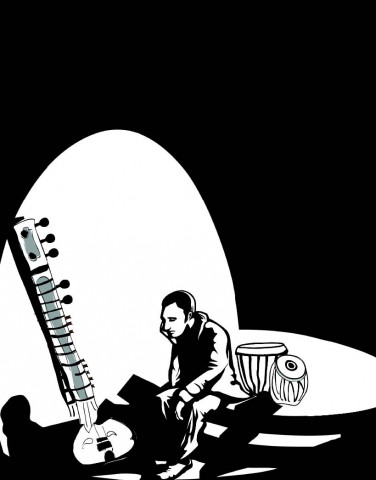Remember the hotel musicians?
Listeners now prefer catchy contemporary numbers as opposed to instrumental or classical music.

If you happen to be sitting at the Nadia Coffee Shop at the Marriott Hotel and indulging in some sweet and savoury treats with a piping hot cup of chai in the daytime, you will notice a pleasant sound of music.
Tabla player Aijaz Khan and sitar player Asif Mehtab diligently play their gentle classical tunes for guests who are mostly unaware of their presence.
“Eastern music is nothing without the tabla,” says Khan with a sort of bruised pride, adding that he has been playing since he was 15 years old. Mehtab is also a firm believer that classical instruments add value to musical compositions, as he says “Rhythm in music develops overtime — this can only be provided by sitar.”
But despite their eagerness and talent, appreciation for these musicians is seeing a sharp decline, especially since listeners now prefer catchy contemporary numbers. “Listening to classical music should be considered a treat, but sadly, that is no longer the case. It is not appreciated the way it should be,” says Mehtab. Artists like Khan and Mehtab try to earn their livelihood by staying true to their love for classical tunes, but the community faces common setbacks: there is little money and no success.
“We don’t see any future in this particular field,” he continues, adding that he — like most others who complain about the woes of the entertainment industry — holds the government responsible for not supporting an art that was once treasured.
Khan feels that pop singing sensations have further weakened classical, and for that reason, no one cares much for string performers. As he recalls the past, Khan’s face lights up when he speaks of the audience’s appreciation of his music 12 years ago. “People in the audience often made song requests,” he says fondly, adding that they were happy to fulfill their requests. “But we seldom find people appreciating instrumentals now; only a few still recognise its value.”
With no awards and appreciation, young Mehtab feels a stint abroad has its own charm “and is no less than an award itself.”
Without disclosing his salary, Mehtab said that the month of Ramazan was the most difficult time for him, as he was off-duty — and without income — for the entire month. While most others prepared for the festive season with great fervor, Mehtab said him and Khan had to survive on their savings.
No money
Twenty-three-year old Rayana Saleem, a singer at the Sheraton Hotel’s Fanoos Lounge, who performs classical numbers till late in the evening, is also disgruntled. While she has always been passionate about charming the crowd with her vocals, she feels hers is not the ideal profession to pursue. Saleem fears that her singing is not appreciated, but is more reluctant to continue due to the limited income a singer in her position earns. Saleem has to share her monthly earnings — Rs30,000 per month — with two of her band members. To make ends meet, she works as a customer service officer at a shipping firm.
Saleem, who is happy to sing songs requested by members of the audience — which are mostly Nazia Hassan hits or Hadiqa Kiana numbers — hopes to venture off to greener pastures someday, possibly Dubai, where she feels her talent will be appreciated.
At the end, Mehtab leaves us with food for thought. “We, the classical musicians, are a treasure of this country. Embrace us before we are no longer in your midst.”
Published in The Express Tribune, September 7th, 2012.
Like Life & Style on Facebook for the latest in fashion, gossip, entertainment



















COMMENTS
Comments are moderated and generally will be posted if they are on-topic and not abusive.
For more information, please see our Comments FAQ